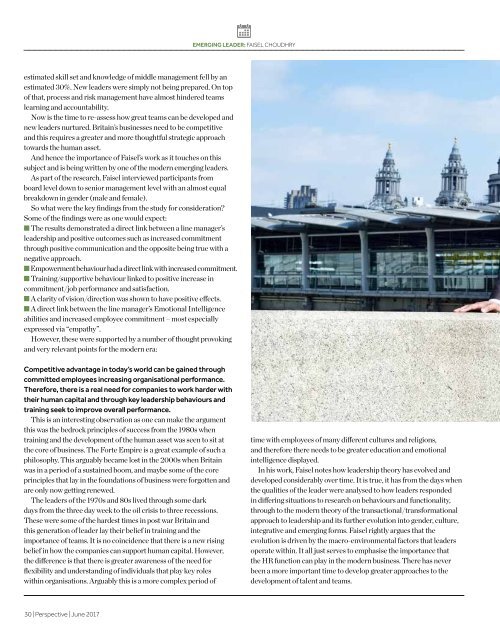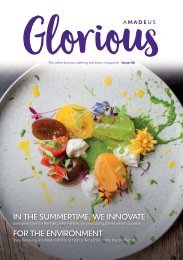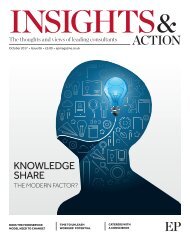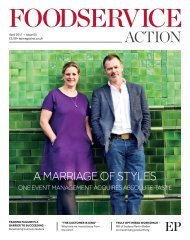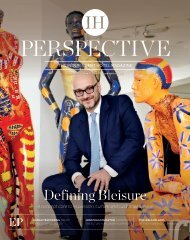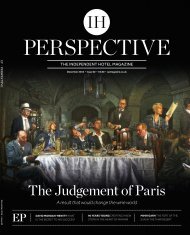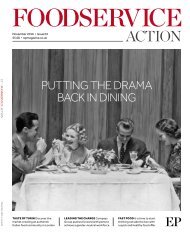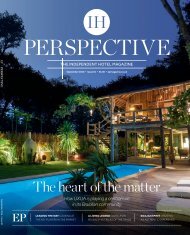EP Perspective June 2017
The title talks about the whole Hospitality sector, including the fine hotels, delicious restaurants, leading foodservice companies and the wider community. The magazine launched with a focus on independent hotels and has evolved to include thought leadership pieces on the whole sector. Articles focus on customer service, the guest experience, new innovation being adopted and much more. Their are many pacesetters in hospitality and EP is keen to showcase the real stories. Perspective is published on a quarterly basis and is written for senior players in hospitality. It is available in both a printed and digital format. Perspective puts a spotlight on some of the great things being achieved and the fascinating stories behind the businesses.
The title talks about the whole Hospitality sector, including the fine hotels, delicious restaurants, leading foodservice companies and the wider community.
The magazine launched with a focus on independent hotels and has evolved to include thought leadership pieces on the whole sector. Articles focus on customer service, the guest experience, new innovation being adopted and much more. Their are many pacesetters in hospitality and EP is keen to showcase the real stories.
Perspective is published on a quarterly basis and is written for senior players in hospitality. It is available in both a printed and digital format.
Perspective puts a spotlight on some of the great things being achieved and the fascinating stories behind the businesses.
You also want an ePaper? Increase the reach of your titles
YUMPU automatically turns print PDFs into web optimized ePapers that Google loves.
EMERGING LEADER: FAISEL CHOUDHRY<br />
estimated skill set and knowledge of middle management fell by an<br />
estimated 30%. New leaders were simply not being prepared. On top<br />
of that, process and risk management have almost hindered teams<br />
learning and accountability.<br />
Now is the time to re-assess how great teams can be developed and<br />
new leaders nurtured. Britain’s businesses need to be competitive<br />
and this requires a greater and more thoughtful strategic approach<br />
towards the human asset.<br />
And hence the importance of Faisel’s work as it touches on this<br />
subject and is being written by one of the modern emerging leaders.<br />
As part of the research, Faisel interviewed participants from<br />
board level down to senior management level with an almost equal<br />
breakdown in gender (male and female).<br />
So what were the key findings from the study for consideration?<br />
Some of the findings were as one would expect:<br />
n The results demonstrated a direct link between a line manager’s<br />
leadership and positive outcomes such as increased commitment<br />
through positive communication and the opposite being true with a<br />
negative approach.<br />
n Empowerment behaviour had a direct link with increased commitment.<br />
n Training/supportive behaviour linked to positive increase in<br />
commitment/job performance and satisfaction.<br />
n A clarity of vision/direction was shown to have positive effects.<br />
n A direct link between the line manager’s Emotional Intelligence<br />
abilities and increased employee commitment – most especially<br />
expressed via “empathy”.<br />
However, these were supported by a number of thought provoking<br />
and very relevant points for the modern era:<br />
Competitive advantage in today’s world can be gained through<br />
committed employees increasing organisational performance.<br />
Therefore, there is a real need for companies to work harder with<br />
their human capital and through key leadership behaviours and<br />
training seek to improve overall performance.<br />
This is an interesting observation as one can make the argument<br />
this was the bedrock principles of success from the 1980s when<br />
training and the development of the human asset was seen to sit at<br />
the core of business. The Forte Empire is a great example of such a<br />
philosophy. This arguably became lost in the 2000s when Britain<br />
was in a period of a sustained boom, and maybe some of the core<br />
principles that lay in the foundations of business were forgotten and<br />
are only now getting renewed.<br />
The leaders of the 1970s and 80s lived through some dark<br />
days from the three day week to the oil crisis to three recessions.<br />
These were some of the hardest times in post war Britain and<br />
this generation of leader lay their belief in training and the<br />
importance of teams. It is no coincidence that there is a new rising<br />
belief in how the companies can support human capital. However,<br />
the difference is that there is greater awareness of the need for<br />
flexibility and understanding of individuals that play key roles<br />
within organisations. Arguably this is a more complex period of<br />
time with employees of many different cultures and religions,<br />
and therefore there needs to be greater education and emotional<br />
intelligence displayed.<br />
In his work, Faisel notes how leadership theory has evolved and<br />
developed considerably over time. It is true, it has from the days when<br />
the qualities of the leader were analysed to how leaders responded<br />
in differing situations to research on behaviours and functionality,<br />
through to the modern theory of the transactional/transformational<br />
approach to leadership and its further evolution into gender, culture,<br />
integrative and emerging forms. Faisel rightly argues that the<br />
evolution is driven by the macro-environmental factors that leaders<br />
operate within. It all just serves to emphasise the importance that<br />
the HR function can play in the modern business. There has never<br />
been a more important time to develop greater approaches to the<br />
development of talent and teams.<br />
Communication skills are critical to increased commitment.<br />
The communication style should be:<br />
n Authentic<br />
n Clear<br />
n There needs to be a conscious acknowledgement that remote<br />
working should not lead to a decrease in face to face opportunities<br />
n It is simply not enough for an organisation to produce a vision<br />
statement. It must be an active part of an employee’s day-to-day<br />
interaction with and for the organisation.<br />
n Through empowerment, it is important that managers encourage<br />
employees to take risks and not to create a blame culture.<br />
n Training/supportive behaviours are critical to commitment.<br />
Organisations need to have formal structured yet flexible training<br />
programmes.<br />
n Treating employees as individuals.<br />
n Organisations need to understand that whilst Emotional<br />
Intelligence (EI) can be taught, it is not an easy process. There is a<br />
need for self-awareness within management.<br />
Faisel writes: “As all individuals are unique, so too are their needs.<br />
Leaders must adapt their style and behaviours accordingly and<br />
those leaders with EI will be best placed to do this through greater<br />
levels of self-awareness, self-regulation, motivation, empathy and<br />
social skill to develop and inspire their employee’s commitment,<br />
thus leading to increased productivity and in the end, to personal and<br />
organisational success.”<br />
One of the aspects that make Faisel’s work stand out is that at its<br />
heart it lies with the pursuit of knowledge. He writes:<br />
“You should be more knowledgeable today than you were yesterday,<br />
and more knowledgeable tomorrow than you are today, since if you do<br />
not make some improvements on a daily basis, in effect you are going<br />
backwards; the world would have changed and improved and you<br />
would not have progressed accordingly”<br />
One of the other great debates that has been going on is the challenge<br />
in managing Millennials in comparison to the skills and behaviours<br />
possessed by the Baby Boom generation. Arguably the Baby Boom<br />
generation was driven more by an action culture that reflected the<br />
ethos of the 1980s being about personal responsibility and personal<br />
accountability. It was about creating actions to power growth in wealth<br />
and the economy. It was Thatcher’s ethos. It wasn’t all good; it wasn’t<br />
all bad but for a period of time it was very effective. This generation has<br />
led the industry for close to twenty years very successfully. Their legacy<br />
is safe and secure as having been at the heart of a golden era.<br />
The problem is, this is a different era with a different ethos. The<br />
emerging generations do look at life in a very different way – one<br />
where knowledge and community sit at the heart. Faisel is an example<br />
of this new breed. Faisel is certainly not afraid of actions having<br />
worked hard to build his career, complete his MBA whilst working<br />
and playing a role in mentoring other young leaders. He is as action<br />
focused as anyone. The difference is that his outlook is different and at<br />
the heart lies a desire to learn and improve.<br />
The Millennials have taken some intense criticism in recent<br />
times – some of it is fair, they do often lack the life skills that the<br />
Baby Boomers naturally possessed but is this their fault or have they<br />
been more protected in their developmental years? However, this is<br />
also one of the first generations to emerge from University with debt<br />
and they view life with, not concern or stress, but a greater belief in<br />
knowledge, globalisation, community and social agenda. There is a<br />
belief in the good from capitalism being combined with the good from<br />
social agendas to create new solutions.<br />
The whole concept really started growing again in the mid to late<br />
1990s and great examples include:<br />
n The Eden project<br />
n John Lewis Partnership<br />
n The Big Issue<br />
n Co-op<br />
n Cafedirect ><br />
30 | <strong>Perspective</strong> | <strong>June</strong> <strong>2017</strong> epmagazine.co.uk | 31


